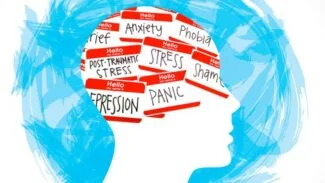The term mental health in India has gone through its journey when it comes to recognizing and defining it. For the longest time mental well-being was a mere absence of mental illness and what was considered mental illness was a narrow list of most psychiatric disorders like complete psychosis or schizophrenia. WHO today defines it as “a state of well-being in which the individual realizes his or her own abilities, can cope with the normal stresses of life, can work productively and fruitfully, and is able to make a contribution to his or her community”. The emphasis is on the ability to cope with normal but disruptive issues of everyday life and hence, it is more inclusive.
WHY IS MENTAL HEALTH IMPORTANT?
- Most mental health issues affect our physical health, especially immunity.
- Mental health is hence, equally as important as physical health.
- Mental health discussions reduce social stigma and increase access to facilities and accurate reporting and treatment.
- Poor mental health affects our overall well-being and functioning which may disrupt our personal as well as professional lives.
COMMON DISORDERS AND EARLY SIGNS
According to the National Mental Health Survey 2015-16 (NMHS), 13% of all Indians face “deteriorated” mental health at some point in their whole lifetime. Before fighting the illness it is important to recognize and garner acceptance for the mental illness that the person is going through. Following is the list of few common disorders with their respective early signs—
DEPRESSION
It is a common illness that is often characterized by persistent sadness and a loss of interest in things or activities that one usually enjoys. Adding on to that it also includes the inability to carry out daily activities for a minimum of two weeks.
BIPOLAR DISORDER
Formerly termed a manic depression, this mental health condition causes extreme mood swings that include emotional highs and lows. Two common types of this kind are:
- Bipolar I – The person’s behaviour and shifts in mood are extreme, and their behaviour quickly escalates until they’re out of control.
- Bipolar II – It is considered more common than bipolar I. It also involves depressive symptoms, but it’s manic symptoms are much less severe and are called hypomanic symptoms.
ANXIETY DISORDER
Anxiety is a normal emotion in situations that provoke fear or excitement. But when the frequency and severity of anxious episodes spikes, this may be a sign of an anxiety disorder. People living with an anxiety disorder may feel irrational restlessness, irritability, anger issues, and difficulty in concentrating and sleeping.
EATING DISORDER
This disorder is most common among Generation Z I.e. the people born between 1996 and 2015 across the globe. Although it is more common in the west, Indian teens are also going through this condition. People with an eating disorder may constantly feel distressed or depressed or excessively concerned about their body shape and weight. Anorexia nervosa (self-starvation), bulimia nervosa (binge eating followed by purging or vomiting, and then a period of starvation and excessive physical activity) or binge eating disorder are a few examples of eating disorders.
WAYS AND ACTIVITIES TO PROMOTE GOOD MENTAL HEALTH
Emotional health problems are something that all of us go through during various phases of life but what is important here is to overcome them.
BEING SOCIAL
Talk to your close ones in person and be vocal about your problems.
STAYING ACTIVE
This does not mean spending hours in the gym. It can be simple activities like taking a walk in your favourite garden or dancing to your favourite music.
SET REALISTIC GOALS
The easiest way to feel optimistic in life is to achieve your goals. For this purpose, it is important to set goals that aren’t impossible or highly brutal.
QUIET YOUR MIND
Try meditating and relaxing your mind by doing things that put you in peace.
BREAK UP THE MONOTONY
Give a break from your tedious life and change your routine by adding time for yourself in your schedule.
In the end, just remember not to give up. Things might seem hard but they surely aren’t impossible.
“The first step toward change is awareness. The second is acceptance”, said Nathaniel Branded, heeding to these words, we must propagate the importance of understanding mental health and breaking taboos associated with it.
- The initial step to be taken is to talk openly about mental health and normalise it.
- Spreading thoughts and stories about the cause can help people realise the gravity of the issue.
- The establishment of ideas that can wipe stigma and discrimination can be done by organising interactive sessions with psychologists and people.
- On the individual scale, each one of us can contribute to this movement by educating oneself about various mental health problems and their symptoms.
- Sharing the experience of people who suffer from mental health is the best way to spread awareness that it is as vital as physical health.
- Finally, we should learn to neither treat people suffering from mental illness differently nor categorise them to be psychic patients.
Mental health is indeed as important as physical health and it is high time that we realize it. We should learn to spread peace and love among all our loved ones and try to develop the habit of listening and being patient enough to help others.
Must Read: Health in the Times of Online Classes


